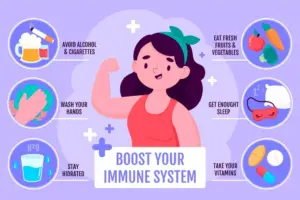Understanding HIV and AIDS: Symptoms, Causes, and Treatment in the UK
HIV (Human Immunodeficiency Virus) and AIDS (Acquired Immune Deficiency Syndrome) remain serious public health issues in the UK. Although advances in medicine have helped, the persistence of stigma warrants the need for awareness. At Chase Lodge Hospital, we believe that giving people the correct information about HIV and AIDS – their symptoms, transmission, testing, and treatment – empowers them. This guide seeks to present a comprehensive resource in UK English for people seeking accurate and reliable information.
What is the Difference Between HIV and AIDS?
The Human Immunodeficiency Virus or HIV targets the immune system and kills CD4 cells which stand in defence of infection. In absence of treatment, HIV threatens to gradually deplete the immune system over years. AIDS signifies an advanced state of infection with HIV in which the immune system bears grave damage and there is an ensuing opportunistic infection.
To differentiate between the two, HIV is the virus, and AIDS refers to the sum of signs and symptoms. With early diagnosis and appropriate treatment, almost everyone with HIV in the UK would, thanks to highly effective antiretroviral therapies, never go on to develop AIDS.
How is HIV Transmitted? Causes of AIDS and HIV
HIV spreads through specific bodily fluids including blood, semen, vaginal fluids, rectal secretions and breast milk. The most common transmission routes in the UK include unprotected sexual contact and sharing needles or other injecting equipment. Mother-to-child transmission during pregnancy, birth or breastfeeding is now rare in the UK due to routine testing and preventive treatments.
It’s important to note that HIV cannot be transmitted through everyday casual contact. Activities like hugging, kissing, sharing utensils or using public toilets pose no risk. The virus isn’t spread through saliva, sweat or tears in normal circumstances.
HIV and AIDS Symptoms: Recognising the Signs
Early Stage (Acute HIV Infection)
Within 2–4 weeks of exposure, some people experience flu-like symptoms, known as acute retroviral syndrome (ARS):
- High fever and chills
- Night sweats
- Fatigue and muscle aches
- Sore throat and swollen lymph nodes
- Rash (often on the torso)
- Mouth ulcers
Important Note: These symptoms may disappear, but the virus remains active.
Chronic HIV (Without Symptoms)
Without treatment, HIV progresses silently, damaging the immune system over years.
AIDS (Late-Stage HIV)
If untreated, HIV leads to AIDS, marked by:
- Severe weight loss and chronic diarrhoea
- Persistent fever and extreme fatigue
- Opportunistic infections (pneumonia, tuberculosis, certain cancers like Kaposi’s sarcoma)
Is HIV and AIDS Curable? Treatment Options in the UK
Currently, there is no cure for either HIV or AIDS, but effective treatment can allow anyone to have a long, healthy life.
Antiretroviral Therapy (ART)
- A combination of daily medications that suppress the virus.
- Reduces viral load to undetectable levels, meaning HIV cannot be transmitted sexually (U=U: Undetectable = Untransmittable).
- Prevents progression to AIDS.
Preventive Measures
- PrEP (Pre-Exposure Prophylaxis) – A daily pill for high-risk individuals to prevent HIV.
- PEP (Post-Exposure Prophylaxis) – Emergency treatment taken within 72 hours of potential exposure.
UK-Specific Resources:
- Free HIV testing and treatment via the NHS.
- Chase Lodge Hospital offers confidential HIV testing and specialist care.
HIV and AIDS Testing: When and How to Get Tested
The procedure for testing is simple, fast, and confidential. Testing would take place at NHS sexual health clinics and some GP surgeries and pharmacies, as well as through Chase Lodge Hospital. Today tests are capable of detecting HIV just four weeks after exposure, with some clinics offering results in as short as a few minutes.
Testing is advised at intervals usually for active individuals or particularly those with multiple sexual partners or engaged in unprotected sexual intercourse. All pregnant women receive routine HIV screening as part of their antenatal care to reduce the risk of mother-to-child transmission.
Preventing HIV and AIDS: Key Strategies
Safe Sex Practices
- Always use condoms during vaginal, anal, or oral sex.
- Regular STI screenings if sexually active.
Needle Safety
- Never share needles – use sterile equipment.
- Access needle exchange programmes if needed.
Medical Prevention
- PrEP for high-risk individuals (available on the NHS).
- PEP for emergency prevention.
Pregnancy and HIV
With proper treatment, the risk of mother-to-child transmission is less than 1%.
Conclusion
The present state of affairs attests to the fact that people diagnosed with HIV in the UK can expect to live long, healthy lives provided that appropriate treatment is available. The earlier the need arises, the better, through regular testing, particularly if potential exposure has occurred. Chase Lodge Hospital offers confidential testing for HIV, consultation with experts over HIV issues, and personalisation of care plans.
Do not hesitate to inquire about HIV-related exposure or symptoms whenever required. HIV, with modern treatment, does not need to mean a life-limiting condition anymore. You can visit the clinic or search the NHS website for information on the various tests and treatment options available for you.



